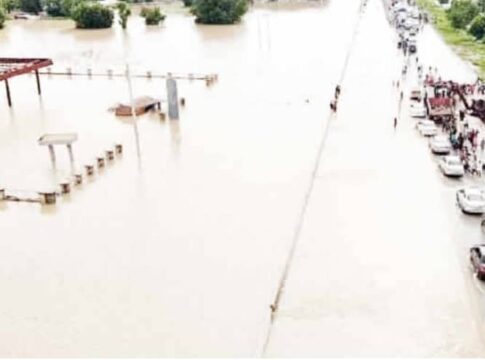In a pressing warning, the Federal Government has alerted Nigerians to the looming threat of river flooding on the Niger and Benue rivers, as water levels continue to rise at an alarming rate.
Minister of Water Resources and Sanitation, Joseph Utsev, urged citizens to exercise extreme caution and take proactive measures to mitigate the potential disaster in the southern region.
The warning comes on the heels of the recent devastating flood in Maiduguri, Borno State, which was triggered by the overflow of water from the Alau Dam. This tragic event serves as a stark reminder of the importance of vigilance and preparedness in the face of natural disasters.
READ MORE: UK Moves To Promote Nigerian Languages, Cultural Heritage, Unveils AE Learning
According to the Nigeria Hydrological Services Agency’s 2024 Annual Flood Outlook publication, a staggering 31 states, including Borno, Bauchi, Jigawa, Taraba, Yobe, Benue, and Gombe, have been identified as high flood risk areas.
This stark reality underscores the urgent need for collective action to prevent or minimize the impact of flooding.
Minister Utsev emphasized the need for sustained vigilance and enhanced preparedness, drawing attention to the recommendations of the Presidential Committee on the Development of a Strategic Plan for Preventing Flood Disasters in Nigeria.
The committee’s report outlined a comprehensive roadmap for addressing the perennial flooding menace, including 10 strategic areas of intervention and a detailed plan for pre, during, and post-flood activities.
In a bid to bolster the nation’s flood response capabilities, the Federal Government has approved a whopping ₦108 billion for all 36 states to tackle perennial flooding. This significant investment underscores the government’s commitment to safeguarding the lives and livelihoods of Nigerians.
As the nation teeters on the brink of another flood disaster, it is imperative for citizens, governments, and stakeholders to join forces in a collective effort to prevent or mitigate the impact of flooding.
By working together, we can reduce the risk of flooding and create a safer, more resilient future for all.




